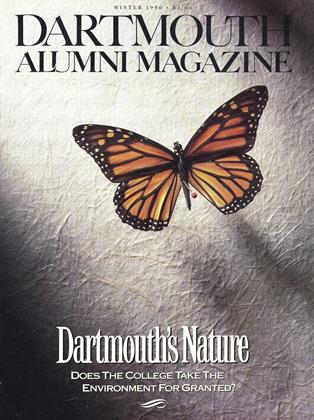A frank exit interview with the(extremely) outgoing Alumni Fund director.
ALUMNI FUND DIRECTOR Henry Eberhardt '61 has left Dartmouth after 20 years as the College's most zealous evangelist of fundraising. His new job: vice president of external affairs fairs at Dalhousie University in Halifax, Nova Scotia. The Alumni Magazine caught up with him in September, as he was cleaning out his office.
Dartmouth Alumni Magazine: Yourresume looks like a casting call for Joe All-American: Vietnam vet, navy lieutenantcommander.; scoutmaster.; Sunday schoolteacher, American Legion, baseball, icehockey, crew, Ivy League...the Canadianswere obviously impressed. But are you in forsome culture shock?
Henry Eberhardt: I'm sure that some of those credentials won't mean as much in Canada as they do in the United States, but others do, such as working with kids or being active in the community. I think that's one thing we all learned indirecdy when we went to Dartmouth: in addition to your studies, you're also preparing yourself for service in your community, school board, church, or other organizations.
While we're talking about service, whatwas it like to go from the military of thesixties to academia of the seventies?
I remember one rally after Kent State where the Green was entirely filled with students, townspeople, faculty, and administration. I'm thinking to myself, "My God, here I was just in the war and now I'm here and I'm seeing what is going on at home." The people and their attitudes had changed, reflecting the times.
Gradually, though, the pendulum swung. Dartmouth probably was as liberal as it could get in 1970.1 watched it come all the way back through the center to the eighties, when there were more conservatives than I can remember in my day. When I was here in '57 to '6l, it was certainly conservative, but we didn't have a lot of serious opinions. Now I think we're going to ease back a bit from the far right.
During the decade you directed theAlumni Fund, annual giving doubled. Butparticipation is down from the glory dayswhen Dartmouth was the undisputed leaderin alumni loyalty.
When I arrived it was at 57 to 58 percent, and now we're at 60. Which is still below its peak at 65. Participation is difficult to maintain now, because you have so many more younger people who are graduating with other obligations such as loans or graduate schools, or families to support There are so many social causes and community activities since the Reagan years of cutting back federal support for charitable institutions.
Controversy makes fundraising even more difficult. But the older classes, where there is a lot of disgrundement, are by and large above the fund average.
Handle this phone call: "I get the impression that Dartmouth has abandoned its traditional ethos as a small college, and has finally buried Daniel Webster and turned itselfinto an impersonal research university."
Trevor—my son Trevor is a freshman—will have the very best professors during his freshman year. He's not going to have any graduate assistants, he's not going to have any teaching assistants, he's not going to have any visiting assistant professors. He's going to have Charlie Wood teaching history, he's going to have Hans Penner for religion. I could give you a half an hour on that.
That's enough, thanks. One of your newduties will be overseeing public relations atDalhousie. Doing P.R. at quiet Dalhousieafter Dartmouth must make you feel like acombat veteran at peacetime. Or has Dartmouth prepared you well?
What many of us will miss most aboutyou is your famous Giving Argument, thereasons why alumni should contribute. Giveus an encore, Henry—let's hear your spielone more time.
We have to be aware of the fact that tuition is only half of students' educational costs and that the other half has to come from some other source: namely alumni gifts and endowment income. We need to support those who are here as we were supported by those who went before us.
Also, Daniel Webster fought his case in order to separate education from government interference. Americans are unique in their idea of philanthropic support, not only in education but all other charitable institutions. You go to Europe, Canada, Australia—I've talked to representatives from schools in those countries—and they just don't understand the whole concept of private giving from individuals. I'll have my work cut out for me when Igo north. am
"We need to support thosewho are here as we weresupported by those who wentbefore us," says Henry.
 View Full Issue
View Full Issue
More From This Issue
-
 Feature
FeatureWHEN THE YOUNG TURKS CAME
December 1990 By John G. Kemeny -
 Cover Story
Cover StoryDartmouth’s Nature
December 1990 By Jonathan Kohl ’92 -
 Article
ArticleDR. WHEELOCK’S JOURNAL
December 1990 By E. Wheelock -
 Article
ArticleThe Case Against the Dartmouth Review
December 1990 By George B. Munroe -
 Class Notes
Class Notes1980
December 1990 By Michael H. Carothers -
 Class Notes
Class Notes1953
December 1990 By Fred Carleton
Features
-
 Feature
FeatureUNDERWATER TREASURE
December 1960 -
 Cover Story
Cover StoryCOMMENCEMENT
June • 1985 -
 Feature
FeatureA Thinking Man's TV Journalist
June 1960 By JAMES B. FISHER '54 -
 Feature
FeatureMiSSING IDOL:KOM AGAIN?
December 1973 By MICHAEL STUART '71 -
 Feature
FeatureThe Disappearing Ivory Tower
DECEMBER 1963 By SAMUEL B. GOULD -
 Feature
Feature"As Active As They Are Bright"
June 1961 By THADDEUS SEYMOUR


